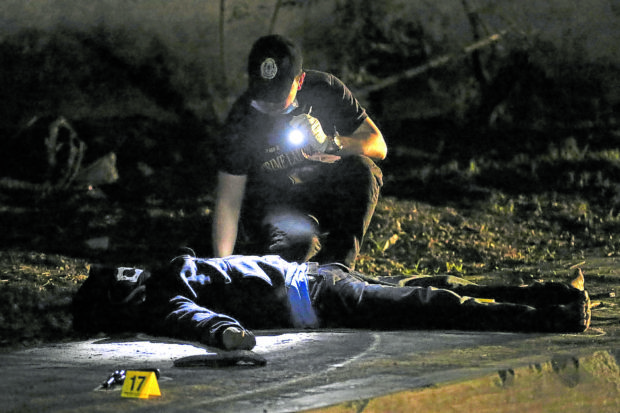PNP continues to cover up drug war killings, obstructing justice — int’l rights group

WAR ON DRUGS A police investigator inspects the body of a suspected victim of extrajudicial killing. (File photo from the Philippine Daily Inquirer)
MANILA, Philippines — Philippine security forces, particularly the Philippine National Police (PNP), have continued “perpetrating extrajudicial killings” and “obstructing justice” in connection with the probe of the Department of Justice (DOJ) into the Duterte administration’s drug war.
This was among the conclusions of the Second Report of Investigate PH, which was released on Tuesday by the international rights watchdog and made available for download on its website.
In that report, Investigate PH said the PNP has been covering up the circumstances of the killings during anti-drug operations, intimidating the families of victims and potential witnesses, and obstructing the review of most killings by the Department of Justice (DOJ).
“While the police claim that those killed in anti-drug operations were resisting – known as the ‘nanlaban’ (fought back) narrative – evidence indicates that unarmed victims have been executed either in their home, on the street or after being abducted, with weapons or drugs likely planted after,” the report said.
“Those killed in anti-drug operations are overwhelmingly poor people unable to assert their rights to due process,” it added.
Article continues after this advertisementIn a hearing conducted by Investigate PH on May 18, photographer Vincent Go showed photographs of victims who were tagged as “nanlaban” wearing handcuffs and zip ties, indicating that there was no way they could have resisted arrest.
Article continues after this advertisementIn the same hearing, a professor of forensic pathology, Dr. Raquel Fortun, said that she encountered these indications in five bodies that she had autopsied.
According to Fortun, these defensive wounds of victims were not recorded by the police. Some of the wounds, made by bullets, were on the wrists of victims “who were raising their arms in front of themselves as they were shot.”
One body had post-death incisions and sutures, indicating an autopsy had been done. But Fortun found out that it was not properly conducted.
The death certificates were also signed by physicians associated with the police, which, according to Investigate PH, indicates cooperation by medical professionals in the cover-up of extrajudicial killings — a violation of medical ethics.
Meanwhile, an Investigate PH commissioner, former Australian Sen. Lee Rhiannon, said that families of the victims also face “intense” pressure from police not to press charges.
“The impact of these killings do not end when the victim dies,” said Rhiannon during the launch of the second report.
“Funeral parlors often work closely with local police. Some extort huge fees from families before they can retrieve the body of their loved one. Pressure from the police for families to not lodge a complaint is often intense at this time and for years after,” she added.
Investigate PH also revealed that organizations that seek redress for the killing of one or more of their families, “come up against a brick wall of bureaucratic resistance from the police, the Ombudsman and the courts.”
Rubylin Litao, a representative of the organization Rise Up, told Investigate PH that she had filed six cases at the Office of the Ombudsman. While one managed to reach the Supreme Court, two were dismissed even after reconsideration. The other four have not yet even been resolved.
“Because of experiences like these, most families have no confidence in the Philippine judicial system,” said Litao in the May 18 hearing.
Last Feb. 24, Justice Secretary Menardo Guevarra said that irregularities were seen in more than half of the 6,000 anti-drug operations the PNP has conducted.
Because of this, the PNP allowed the DOJ to access 61 of its questionable cases related to the drug war. This was later reduced to 53 after the PNP stated that eight of the cases were on appeal.
In a televised public address, President Rodrigo Duterte also invoked national security, claiming that police documents from his administration’s anti-narcotics campaign should be kept secret since they contained confidential information about specific individuals.
This contradicted the Supreme Court’s ruling in 2018 declaring that records involving the deaths of drug suspects during police operations had nothing to do with national security.
“Secretary Guevarra is thus over-promising to the UNHRC, as part of his broad assertion that Philippine domestic remedies are adequate to the perceived human rights challenge,” said Investigate PH.
“The Duterte government has ensured the lack of accountability for police failing to follow standard protocols in thousands of cases of anti-drug operation killings. The Ombudsman has accepted all these killings as part of ‘regularity’ in police operations. The higher courts have also rejected claims by victims’ relatives, in favor of the police,” it added.
Duterte launched his war on drugs on June 30, 2016, the same day he took office.
Between July 1, 2016, and Dec. 31, 2020, the official government figures list 6,011 deaths in anti-drug operations.
The UN Office of the High Commissioner for Human Rights (OHCHR), however, found that the figure as of March 2020 was at least 8,663. While other human rights organizations pegged the number at over 20,000.
RELATED STORIES
Guevarra says drug war report submitted to Duterte; vows to engage with CHR
DOJ, PNP walk a tightrope when it comes to drug war records